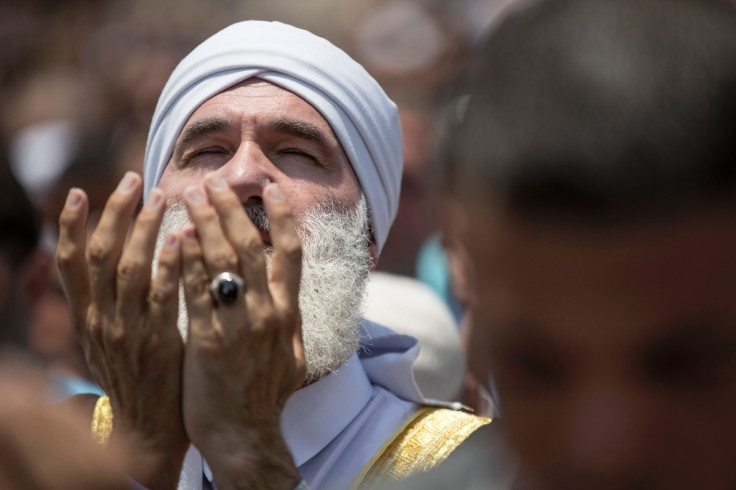Muslim leaders call for 'en masse' Friday prayer at Jerusalem's Al-Aqsa Mosque
Muslims encouraged to return to holy site following weeks of tensions and deadly clashes.
Muslims leaders have called on worshippers to return to pray inside a shrine at a holy site in Jerusalem, following weeks of tensions and deadly clashes.
Violence erupted earlier in July after Israeli authorities installed metal detectors at the site, holy to both Jews and Muslims. The move triggered protests from Palestinians, who saw it s a punitive measure.
Following weeks of unrest, Israel removed the metal detectors. However, Muslims have continued to pray outside the shrine.
"After extensive discussion and after achieving this victory in this round we call on our people in Jerusalem and inside [Israel] and anyone who can access the Al-Aqsa Mosque to enter ... en masse," the Islamic leaders said in a statement, quoted by AP.
Thousands of Muslims from around the country and Palestinian areas gather at the holy compound on Friday afternoon to pray.
Leaders have now called on imams to close mosques across Jerusalem on Friday (28 July), so that Muslims will observe Friday prayers "in Al-Aqsa mosque only".
Tensions have soared since the death of two Israeli police officers, shot dead by Israeli-Arab gunmen in the area surrounding the holy site on 14 July.
Following the attack, Israel installed the metal detectors, arguing the decision came "in light of the events of recent days, which included violent riots near the gates of the Temple Mount and at other sites in villages in East Jerusalem".
Tensions further increased after Israel placed a temporary ban on Muslim men under the age of 50 from entering the holy site on 21 July.
"Entry to the Old City and Temple Mount will be limited to men aged 50 and over. Women of all ages will be permitted," Israeli police explained.
Muslim leaders claimed the restrictions were a way for Israel to expand its control over the site. This was denied by Jerusalem, which said the decision aims to to prevent further violence.
Security cameras

After removing the metal detectors, Israel said it intends to install sophisticated security cameras instead. However, Palestinians have called on authorities to restore the situation at the shrine as it was before the 14 July attack.
Palestinians celebrated after the metal detectors were removed, with people dancing, chanting "God is Great" and setting off fireworks.
Hamas, the Islamic militant group that controls Gaza, praised the move. Izzat Risheq, a senior Hamas leader, said the removal of metal detectors represented a "historic victory" for Palestinians.
"Today, our people celebrate the removal of the gates [security measures], tomorrow they will celebrate the removal of the occupation itself," he said in a tweet.
Some Israeli officials have criticised Israel's decision.
Naftali Bennett, leader of the Jewish Home party, told Army Radio: "Every time the state of Israel folds in a strategic way we get hit with an Intifada [uprising] . You seemingly benefit in the short term but in the long term you harm deterrence."
The holy site is known to Muslims as Haram al-Sharif and to Jews as the Temple Mount, and it is home to the al-Aqsa mosque and the Dome of the Rock.
The site is home to two Jewish biblical temples and it is the holiest site in Judaism.
For Muslims, this is Islam's third-holiest site– after Mecca and Medina in Saudi Arabia – and it represents the area from which the Prophet Muhammad ascended to heaven.
© Copyright IBTimes 2025. All rights reserved.






















